Best Crypto Exchanges in Poland

Summary: Poland has developed into a fast-growing cryptocurrency market with oversight from the Polish Financial Supervision Authority (KNF). Polish investors can easily fund accounts in złoty (PLN) and trade across a wide selection of platforms that comply with European standards.
Here are the six best cryptocurrency exchanges accepting Polish Zloty (PLN) deposits:
Kraken is the best option for Polish investors as it provides access to a diverse crypto selection for trading and staking and facilitates PLN deposits with zero fees.
Licenses
Registered as a VASP (Reg No. RDWW-206)
Available Assets
490+ Cryptocurrencies
PLN Deposit Methods
SEPA, Credit Cards, Debit Cards & Bank Transfers
Top Crypto Trading Platforms in Poland
Poland’s cryptocurrency ecosystem continues to grow under supervision by the Polish Financial Supervision Authority (KNF). Investors can access both international and local exchanges that support deposits in Polish zloty (PLN) and comply with licensing requirements. The table below highlights the top platforms and compares their fees, features, PLN deposit options, and supported assets.
1. Kraken
Kraken has built a reputation as one of the most reliable and secure exchanges for Polish investors since its launch in 2011. Today, the platform supports over 15 million users globally and processes billions in daily volume. It offers more than 490 cryptocurrencies for spot and futures trading.
Users gain access to Kraken Pro, which offers real-time order books, customizable charting, and leverage of up to 5x. The platform also provides over 300 futures markets, appealing to active traders. For everyday investors, simple buy-and-sell options are available through the main interface.
The ecosystem extends beyond crypto trading. Services include staking with yields up to 22% annually, tokenized U.S. equities, and a dedicated institutional suite offering OTC trading and custodial services. Multilingual support, including English and Polish, ensures accessibility for local users.
Platform Highlights:
- Fees: Maker 0.16%, Taker 0.26% (discounted with Kraken+).
- Supported Assets: 490+ cryptocurrencies, tokenized stocks, and ETFs.
- Regulation & Licensing: Licensed under MiCA in Europe; overseen by KNF when serving Polish residents.
- PLN Deposit Methods: SEPA transfers, SWIFT, debit cards, credit cards, and bank deposits.
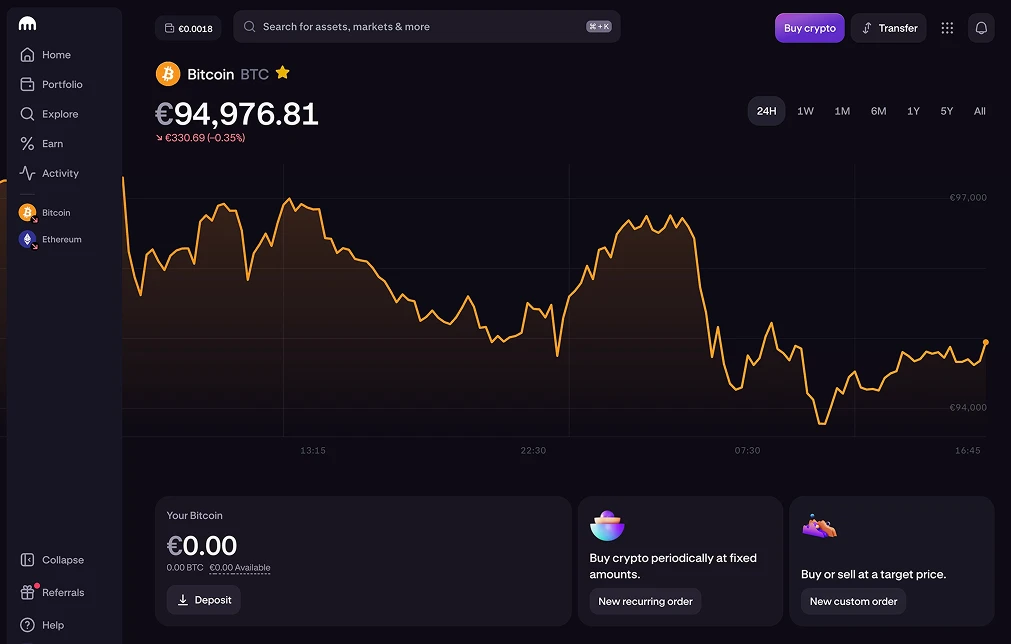
2. Bybit
Bybit is a great option for Polish traders who want exposure to both spot and derivatives markets. Launched in 2018, the exchange now supports over 75 million registered users with daily trading volumes over US$50 billion. It lists more than 2,100 cryptocurrencies for trading and staking.
A standout feature is Bybit’s derivatives suite, which includes perpetual contracts, options, and leveraged trading with up to 200x exposure. The platform also offers copy trading, allowing beginners to follow experienced investors, and trading bots such as grid, DCA, and futures combo tools.
Polish users can also use Bybit Earn, which provides flexible and fixed staking products, lending and borrowing, and Bybit Web3, a portal to DeFi apps, NFTs, and tokenized real-world assets. The mobile app is fully localized and available in multiple languages, including English and Polish.
Platform Highlights:
- Fees: Spot trading starts at 0.1%.
- Supported Assets: 2,100+ cryptocurrencies.
- Regulation & Licensing: Holds a MiCA license for Poland.
- PLN Deposit Methods: SEPA bank transfers, Blik, credit cards, debit cards, Apple Pay, Google Pay, Samsung Pay, Zen.com, mBank (via P2P), PKO Bank (via P2P).
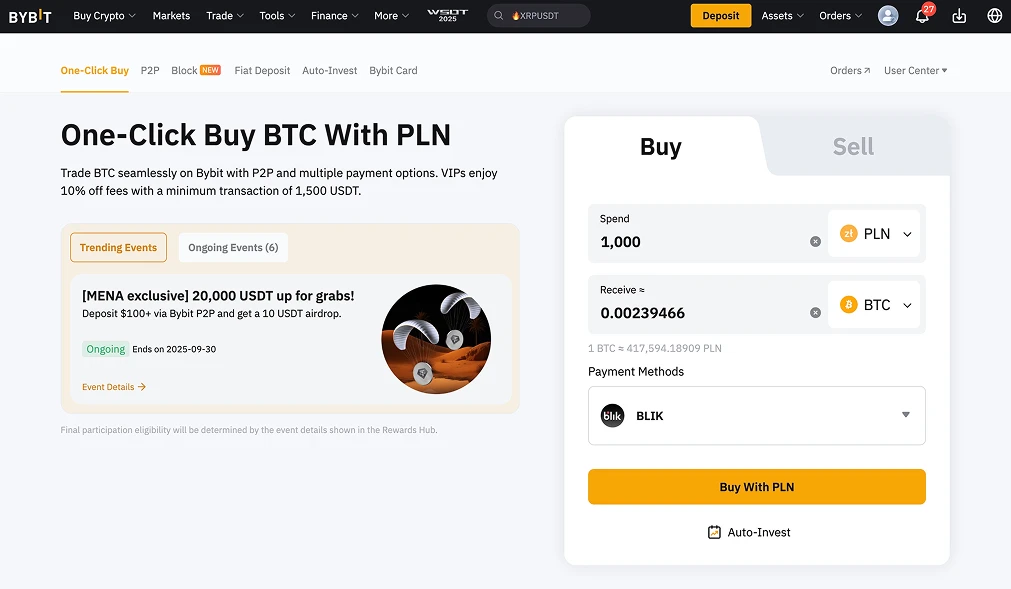
3. Binance
Binance is the world’s most widely used crypto exchange, trusted by more than 270 million registered users across 180+ countries. Its biggest draw is the combination of low fees, deep liquidity, and a vast product suite that covers everything from spot markets to institutional trading solutions.
Users can earn passive income through Binance Earn with flexible or locked staking, participate in Launchpool and Megadrop campaigns to secure new tokens early, and trade NFTs. The exchange also offers P2P trading with zero fees, auto-invest plans, crypto loans, and ETH staking.
The Binance mobile app, available in Polish and English, lets users trade on the go across iOS and Android devices. Security is reinforced through Proof of Reserves, multi-layered account protections, and 24/7 support. It maintains global compliance efforts and aligns with the EU’s MiCA framework.
Platform Highlights:
- Fees: Spot trading from 0.1%.
- Supported Assets: 500+ cryptocurrencies.
- Regulation & Licensing: Binance Poland Spółka z Ograniczoną Odpowiedzialnością is registered as a VASP (registration number RDWW – 465).
- PLN Deposit Methods: SEPA bank transfers, credit cards, debit cards, Apple Pay, Google Pay.
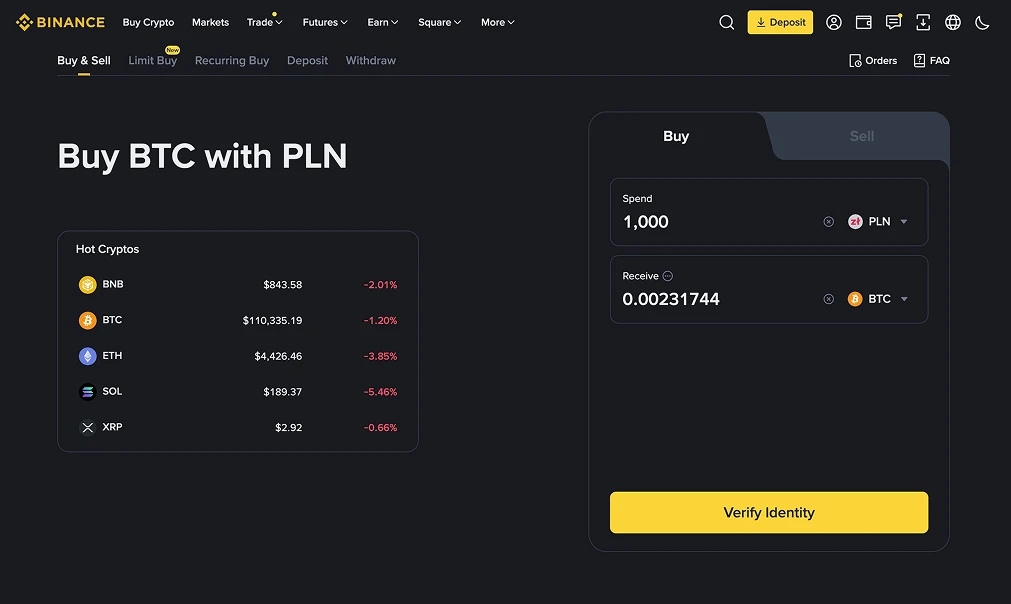
4. Gate
Gate provides one of the most comprehensive digital asset selections in the world, offering Polish users access to more than 3,500 cryptocurrencies. Founded in 2013, the platform has grown to serve over 36 million registered traders worldwide, with daily turnover exceeding US$60 billion.
The exchange provides Simple Earn with flexible and fixed yield options, a copy trading hub that allows beginners to mirror top investors, and a Startup platform where users can participate in early-stage token sales. Its ecosystem also includes perpetual contracts, structured products, and liquidity mining.
Security and transparency are key differentiators. Gate publishes a 123.98% total reserve ratio, backed by Proof of Reserves audits, and operates a dedicated insurance fund to protect user assets. With multilingual support, including English and Polish, it continues to grow its presence in Europe.
Platform Highlights:
- Fees: Spot trading from 0.2%, with discounts available using GT token.
- Supported Assets: 3,500+ cryptocurrencies.
- Regulation & Licensing: Operating since 2013, aligning with EU AML rules and preparing for MiCA.
- PLN Deposit Methods: SEPA bank transfers, credit cards, debit cards, Apple Pay, Google Pay, Samsung Pay, Revolut.
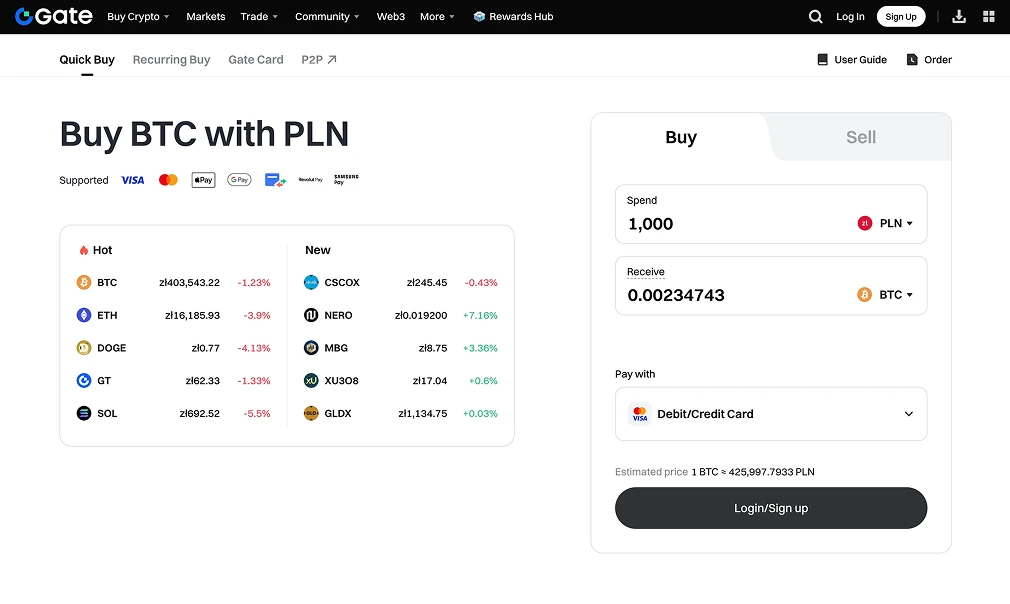
5. KuCoin
KuCoin is one of the most versatile exchanges for Polish users, known for its high-yield staking products. It has expanded to cover 200+ countries and built a user base of more than 40 million investors. There are over 900 cryptocurrencies listed with a daily trading volume topping US$10 billion.
KuCoin Earn allows users to access flexible savings, structured products, and DeFi-style staking opportunities with up to 600% APY. Traders can also access spot, margin, and futures markets, while leveraged tokens give exposure without the complexity of margin management.
For Polish investors, KuCoin is accessible in multiple languages, including English and Polish, and offers secure fiat on-ramps through P2P markets and card deposits. Security is reinforced with regularly updated Proof of Reserves, 2FA, and an industry-leading insurance framework.
Platform Highlights:
- Fees: Spot trading starts at 0.1%, with discounts for KCS token holders.
- Supported Assets: 900+ cryptocurrencies.
- Regulation & Licensing: Holds a MiCA license and operates legally in Poland.
- PLN Deposit Methods: Credit cards, debit cards, Apple Pay, Google Pay, Blik.

6. Bitget
Bitget is one of the most community-driven exchanges, now serving over 20 million users worldwide and moving billions in daily trading volume. Founded in 2018, it’s gained recognition for its partnerships with LaLiga, MotoGP, and Lionel Messi, strengthening its brand in Europe and Asia.
For Polish users, Bitget’s key draw is its copy trading system, where over 190,000 elite traders share strategies that can be followed automatically. Beyond copy trading, Bitget provides a full suite of products: spot markets, futures with leverage, staking, savings (Earn), trading bots, and Web3 wallets.
Security is a core pillar. Bitget operates a $715 million Protection Fund, guarantees 1:1 Proof of Reserves, and stores most client assets in cold wallets. Its integration with TradingView charts enhances the trading experience, while the multilingual app ensures accessibility for mobile and desktop users.
Platform Highlights:
- Fees: Spot trades at 0.1%; futures maker 0.02% / taker 0.06%.
- Supported Assets: 800+ cryptocurrencies.
- Regulation & Licensing: Holds a MiCA license in Poland.
- PLN Deposit Methods: SEPA transfers, credit cards, debit cards, P2P trading.

Is Cryptocurrency Regulated in Poland?
Poland’s approach to cryptocurrency regulation is aligned with the EU’s Markets in Crypto‑Assets (MiCA) regime. Presently, crypto services such as exchanges and e‑wallets must register under the AML Act, with full licensing required by the Polish Financial Supervision Authority (KNF) from 2026 onward.
Since December 30, 2024, MiCA has introduced harmonised EU‑wide rules that apply to crypto‑asset service providers, covering licensing, supervisory oversight, and compliance measures like the Travel Rule.
Poland’s draft Crypto‑Assets Act creates stronger enforcement tools for the KNF, including high administrative and criminal penalties, obligations for electronic documentation, record‑keeping, and enhanced investor safeguards. Mining activities remain largely unregulated, though they must adhere to general laws related to land use and electricity consumption.
How is Crypto Taxed in Poland?
Cryptocurrency taxation in Poland is overseen by the Krajowa Administracja Skarbowa (KAS). It operates under a flat-rate system: any profit realized by converting digital assets into fiat currency is taxed at 19%. Taxable events include exchanging crypto for fiat, purchasing goods or services with crypto, or settling liabilities using crypto.
When calculating gains, taxpayers deduct allowable costs from total proceeds to determine taxable profit. The remaining gains are taxed at the same flat rate. Importantly, costs that are not directly tied to buying or selling crypto, like mining hardware, electricity expenses, loan interest, or costs from crypto-to-crypto swaps, cannot be deducted.
Reporting occurs annually through the PIT-38 tax form, covering activity from January 1 to December 31. Submission is required between February 15 and April 30 of the following year. Polish authorities expect detailed reporting; both total crypto-related costs and total sales must be declared, even in years without realized income.
Cryptocurrency Adoption in Poland
Poland’s cryptocurrency market is expanding rapidly, supported by growing retail participation and a clearer regulatory landscape. User numbers are also climbing steadily, with 7.67 million people projected to be active by 2026, representing 19.3% of the population in 2025, rising to 20.3% by 2026.
Adoption is being accelerated not only by individual investors but also by businesses, with more Polish companies beginning to accept digital currencies as a payment method. Oversight from the Polish Financial Supervision Authority (KNF), together with the EU’s MiCA regulation coming into effect in 2025, is providing clarity and building confidence among market participants.
How to Buy Bitcoin in Poland
Polish residents interested in buying Bitcoin benefit from a regulated market shaped by the Polish Financial Supervision Authority (KNF) and upcoming EU-wide MiCA rules. Here’s a straightforward guide to getting started with BTC in Poland:
- Select a Crypto Exchange: Choose a reliable exchange that supports users in Poland and accepts PLN deposits. Options include both global platforms compliant with European regulations and regional providers that meet KNF requirements.
- Create Your Account: Register with the exchange and complete the Know Your Customer (KYC) process. Typically, you’ll need to provide a valid passport or national ID, and in some cases, a document verifying your Polish address, such as a utility bill.
- Deposit Funds: Add money to your trading account using supported payment methods. Popular options in Poland include bank transfers, debit and credit cards, and integrations with local online banking systems.
- Purchase Bitcoin (BTC): Once your account is funded, go to the Bitcoin trading section. Enter the amount of BTC you wish to buy, double-check the transaction details, and confirm your order.
By following these steps, Polish investors can securely purchase Bitcoin while using exchanges that operate within a framework emphasizing compliance, investor protection, and transparent trading practices.
Final Thoughts
Poland’s crypto market is entering a more structured phase, with MiCA and KNF oversight creating a safer environment for traders while maintaining access to global platforms.
For investors, the best approach is to match your goals with the right exchange, whether that means using Kraken for security, Bybit for derivatives, Binance for liquidity, Gate.io for altcoin access, KuCoin for staking, or Bitget for copy trading. Staying compliant with tax rules and choosing regulated platforms will help Polish traders manage risk responsibly.
Frequently asked questions
What is the safest way to store cryptocurrency in Poland?
The safest option is to transfer assets from exchanges into a non-custodial wallet, such as hardware wallets like Ledger or Trezor, which keep private keys offline and protected from hacks.
Can Polish businesses legally accept cryptocurrency payments?
Yes. Many Polish merchants are beginning to accept Bitcoin and other coins for goods and services, provided transactions comply with tax reporting and anti-money laundering (AML) regulations.
Do Polish banks allow transfers to crypto exchanges?
Most major banks in Poland, including PKO Bank Polski and mBank, permit transfers to regulated exchanges, though some may apply additional checks to meet KNF and EU AML guidelines.
Is crypto mining regulated in Poland?
Crypto mining is not directly regulated, but miners must follow general laws covering electricity use, business registration, and taxation on profits if mining is carried out commercially.
%25201%2520(1).webp)
Written by
Emily Shin
Research Analyst
Emily is passionate about Web 3 and has dedicated her writing to exploring decentralized finance, NFTs, GameFi, and the broader crypto culture. She excels at breaking down the complexities of these cutting-edge technologies, providing readers with clear and insightful explanations of their transformative power.

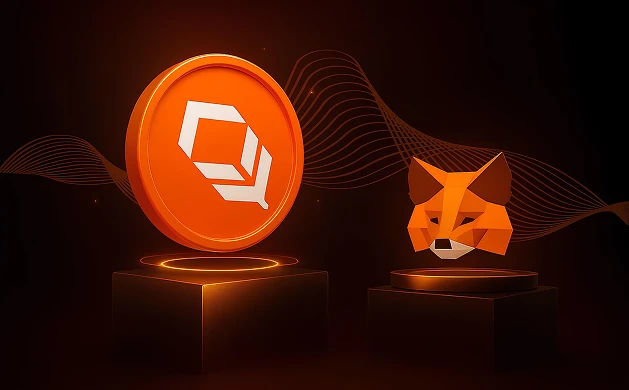

.webp)
%2520(1).webp)




